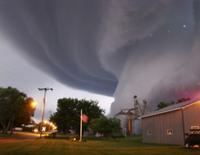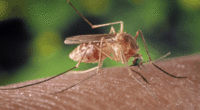-
New tool predicts drought
Knowing when to instigate water saving measures in dry times will be easier from now on, following a breakthrough in drought prediction: an Australian researcher has developed a way to predict droughts six months before they begin
-
-
Pinellas County, Florida simulates anthrax attack
Last Wednesday a local health department in Florida staged an elaborate disaster exercise replete with angry mobs, fainting citizens, and shouting matches; the exercise, dubbed Operation MedStock, gave officials from the Pinellas County Health Department an opportunity to respond to a simulated anthrax attack
-
-
Biolabs: the solution may be the problem

Since the fall 2001 anthrax attacks, there has been a vast expansion of the U.S. bioterror research infrastructure; now, more than 11,000 scientists work on bioterrorism and agroterrorism research in seventeen major and many more smaller labs across the United States; billions of federal dollars are funding research on new vaccines and antibiotics to protect the population from anthrax, plague, tularemia, Ebola, and other lethal germs; what is the likelihood that there is another Bruce Ivins — perhaps more than one — among these thousands of researchers with access to the most lethal pathogens on Earth?
-
-
"Networking" turns up flu virus tied to 2009 pandemic
Scientists using new mathematical and computational techniques have identified six influenza A viruses that have particularly close genetic relationships to the H1N1 “swine” flu virus that swept through the United States beginning in the spring of 2009; that virus eventually killed almost 18,000 people worldwide
-
-
Report warns falling crop yields could spell disaster
A recent study found that as temperatures continue to rise the geographical range of staple crops like corn and beans will become increasingly limited, potentially resulting in massive food shortages; there are currently fifty-six million people who lack food security as temperatures are expected to rise above 86° Fahrenheit; at that temperature, beans are no longer a viable crop, while rice and corn yields suffer
-
-
Sprouts declared source of deadly E.coli outbreak, again
After declaring last week that sprouts were not the culprit of the deadly E. coli outbreak, German officials are now saying that sprouts were indeed the source after all; the announcement comes without conclusive evidence that sprouts were the source of the bacterial outbreak; instead health investigators are relying on circumstantial evidence; tests from the farm located in Lower Saxony have come up negative for the rare strain of E. coli that is sickening patients
-
-
Boulder Colorado hit with plague and rabies
On 3 June, the Boulder County Public Health (BCPH) department warned residents of the Mapleton Hill area that a domestic cat and a dead squirrel had tested positive for the plague; according to Joe Malinowski, the manager of BCPH’s Environmental Health Division, last week a second dead squirrel was found with the plague, but the cat had been successfully treated for the disease; so far there have been no other confirmed cases, but residents have reported several additional dead squirrels
-
-
EU harshly critical of Germany's approach to E. coli crisis
In Germany, responsibilities for responding to a crisis — any crisis — are spread across local, municipal, state, and federal agencies, with no central information center to inform the public, and with little coordination among the various responding bodies
-
-
Terrorist may use food poisoning as weapon
Food and drink sold in Britain — in stores, at restaurants — are under an increasing threat from terrorist groups which might try to poison supplies, thus wreaking havoc and sowing fear, a government security advisers have warned
-
-
Promise of vaccine against deadly malaria parasite

Every year, 10,000 pregnant women and up to 200,000 newborn babies are killed by the malaria parasite; the body’s immune system normally attacks any foreign body, but since our spleen constantly filters our blood and removes ruined or deform blood cells, the body’s natural defense does not need to check the blood; the malaria parasite exploits this fact by using its advanced arsenal of protein hooks to attach itself to the inner side of the blood vessel; researchers find a soltuon
-
-
Germany falsely identifies sprouts as source of outbreak
German health officials have mistakenly identified the source of the deadly E. coli outbreak once again; over the weekend, officials had announced that sprouts were the cause of an outbreak that has killed at least twenty-two people and left more than 600 in critical condition; authorities tested eighteen sprout mixtures, but on Monday results showed that they were not the source of the outbreak; much to the displeasure of Spanish farmers, last week German authorities incorrectly pointed to Spanish cucumbers; officials estimate that Spain’s fruit and vegetable exporters are losing as much as $290 million a week; Spain is seeking reparations
-
-
Bacteria designed for sleuthing
Seven Cambridge University undergraduates spent the summer of 2009 genetically engineering bacteria to secrete a variety of colored pigments, visible to the naked eye; they designed standardized sequences of DNA, known as BioBricks, and inserted them into E. coli bacteria — so the bacteria can now change its color to red, yellow, green, blue, brown, or violet; the bacteria can be programmed to do useful things, such as indicate whether drinking water is safe by turning red if they sense a toxin; other uses for the design bacterium include monitoring food additives, patenting issues, personalized medicine, terrorism, and new types of weather
-
-
How safe is Kansas bio lab from twisters?

DHS officials say they are confident that the proposed bio-defense lab in Manhattan, Kansas, located in the heart of tornado alley, is capable of withstanding a direct hit from a powerful twister; engineers have hardened the $650 million National Bio and Agro-Defense Facility (NBAF) to withstand wind speeds of up to 230 miles per hour; but critics of the planned facility argue that the new standards are inadequate and that the facility must be further reinforced to ensure that in the event of a natural disaster the deadly pathogens and viruses stored there are not spread
-
-
Germany struggles to find source of deadly E.Coli outbreak

German health officials struggling to find the source of deadly E.Coli outbreak suffered another setback when Spanish cucumbers were found to have been incorrectly declared the source of the infections; so far seventeen people have died and more than 1,500 Europeans have been sickened by a rare strain of enterohemorrhagic E. Coli (EHEC); eighty new cases were reported in Hamburg between Monday and Tuesday alone and hospitals are treating 110 patients critically ill with hemolytic uremic syndrome (HUS); the current outbreak has disproportionately affected women, and health officials are struggling to understand why; health officials have urged to not purchase any vegetables declared as potentially dangerous
-
-
Confusing mosquitoes to fight mosquito-borne disease

Female mosquitoes are efficient carriers of deadly diseases such as malaria, dengue and yellow fever, resulting each year in several million deaths and hundreds of millions of cases; to find human hosts to bite and spread disease, these mosquitoes use exhaled carbon dioxide as a vital cue; a disruption of the vital carbon dioxide detection machinery of mosquitoes, which would help control the spread of diseases they transmit, has been a long sought-after goal; University of California-Riverside scientists find a way to do just that
-
More headlines
The long view
We Ran the C.D.C.: Kennedy Is Endangering Every American’s Health
Nine former leaders of the Centers for Disease Control and Prevention (CDC), who served as directors or acting directors under Republican and Democratic administrations, serving under presidents from Jimmy Carter to Donald Trrump, argue that HHS Secretary Roert F. Kennedy Jr. poses a clear and present danger to the health of Americans. He has placed anti-vaxxers and conspiracy theorists at top HHS positions, and he appears to be guided by a hostility to science and a belief in bizarre, unscientific approaches to public health.
